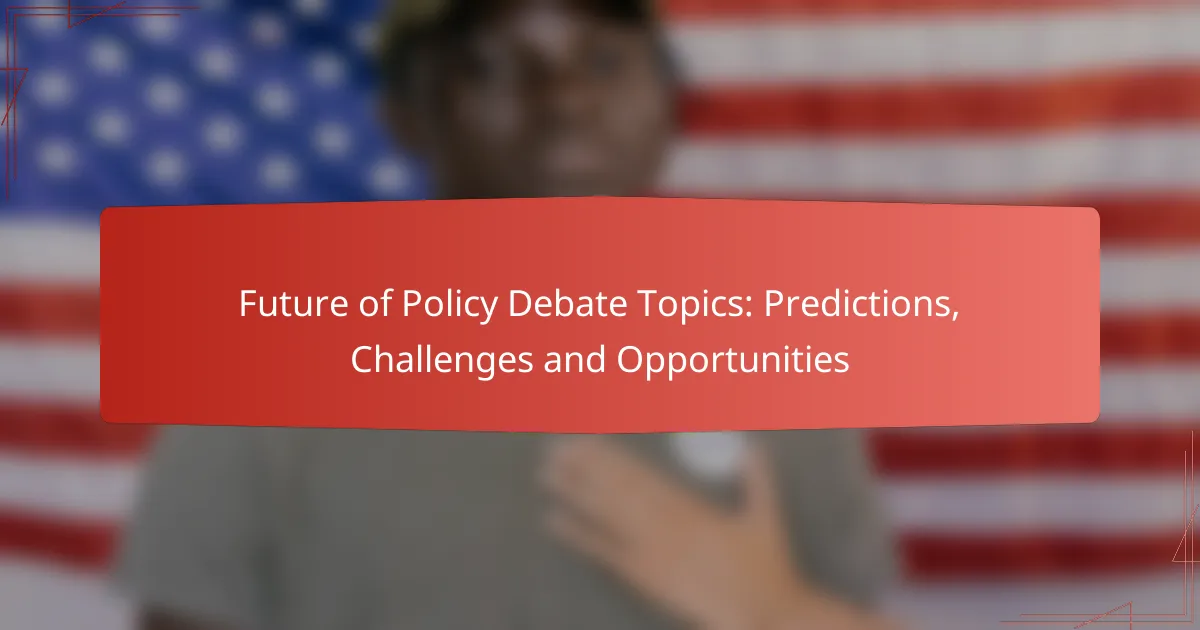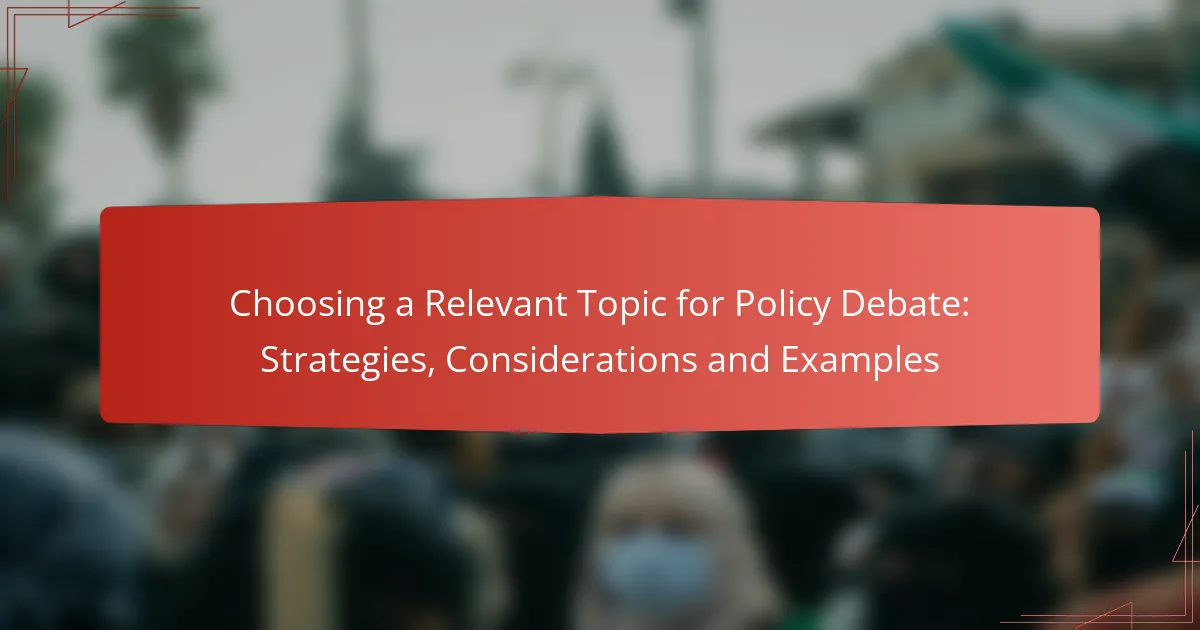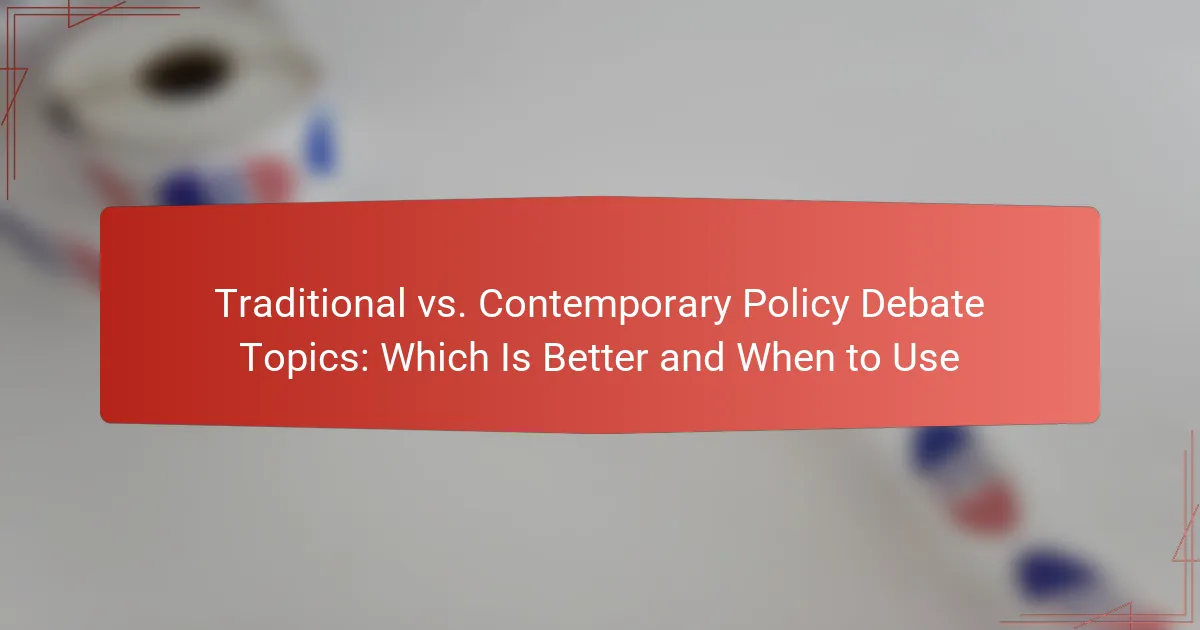The future of policy debate topics is poised to focus on urgent global issues that demand innovative solutions and reflect societal changes. As debaters confront challenges like public opinion polarization and information overload, they will also find opportunities to leverage technology and engage diverse perspectives, ultimately enriching the discourse and fostering informed decision-making.
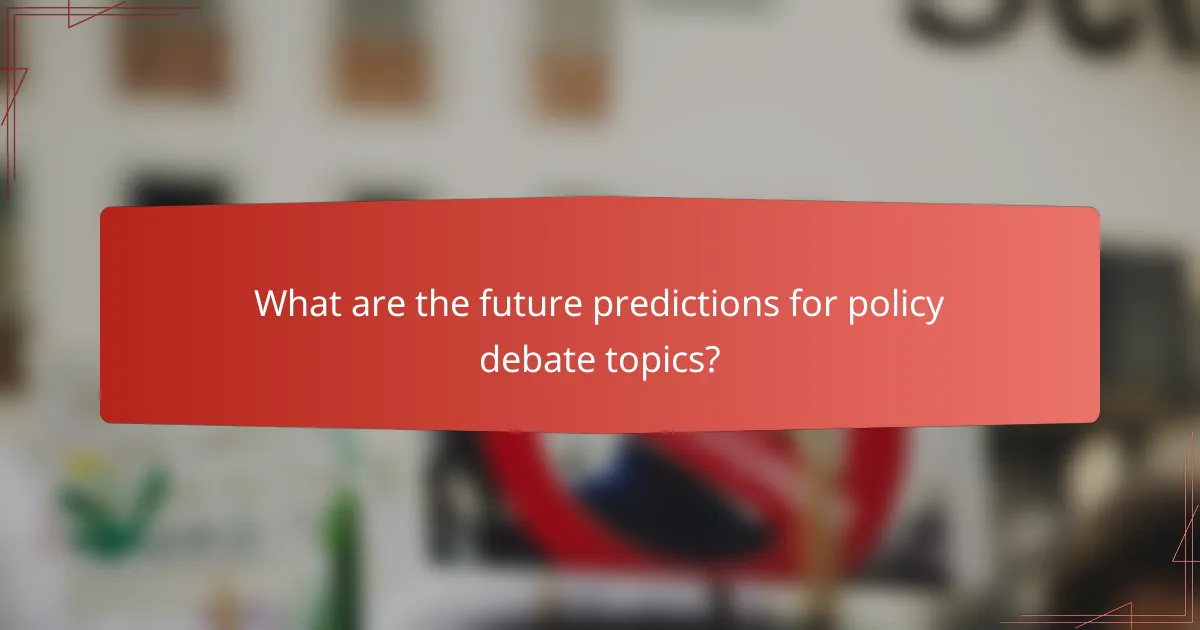
What are the future predictions for policy debate topics?
Future predictions for policy debate topics indicate a shift towards pressing global issues that require urgent attention and innovative solutions. Debaters will increasingly engage with topics that reflect societal changes, technological advancements, and environmental challenges.
Increased focus on climate change
Climate change is expected to dominate policy debate topics as its impacts become more pronounced. Debaters will explore strategies for mitigation, adaptation, and international cooperation to address this global crisis.
Key areas of discussion may include renewable energy policies, carbon pricing mechanisms, and the role of governments in enforcing environmental regulations. Engaging with these topics will require debaters to understand scientific data and economic implications.
Rise of digital governance
Digital governance is emerging as a critical area for policy debate, driven by the rapid advancement of technology. Topics may cover data privacy, cybersecurity, and the regulation of online platforms.
Debaters will need to consider the balance between innovation and regulation, as well as the implications of digital access disparities. Understanding frameworks like the General Data Protection Regulation (GDPR) will be essential for informed discussions.
Emphasis on social justice issues
Social justice issues are gaining prominence in policy debates, reflecting growing public awareness and activism. Topics may include racial equality, gender rights, and economic disparities.
Debaters should be prepared to analyze policies aimed at promoting equity and inclusion, as well as the effectiveness of current measures. Engaging with case studies and real-world examples will enhance the depth of arguments presented.
Global health policy discussions
Global health policy is increasingly relevant, especially in light of recent pandemics. Debates will likely focus on healthcare access, vaccine distribution, and international health regulations.
Understanding frameworks like the World Health Organization’s International Health Regulations will be crucial. Debaters should also explore the implications of health policies on economic stability and social well-being.
Technological impact on governance
The intersection of technology and governance is a vital area for future policy debates. Topics may include the influence of artificial intelligence on decision-making and the ethics of surveillance technologies.
Debaters will need to assess the benefits and risks associated with technological advancements, considering how they reshape public policy and citizen engagement. Familiarity with emerging technologies and their regulatory challenges will enhance debate quality.
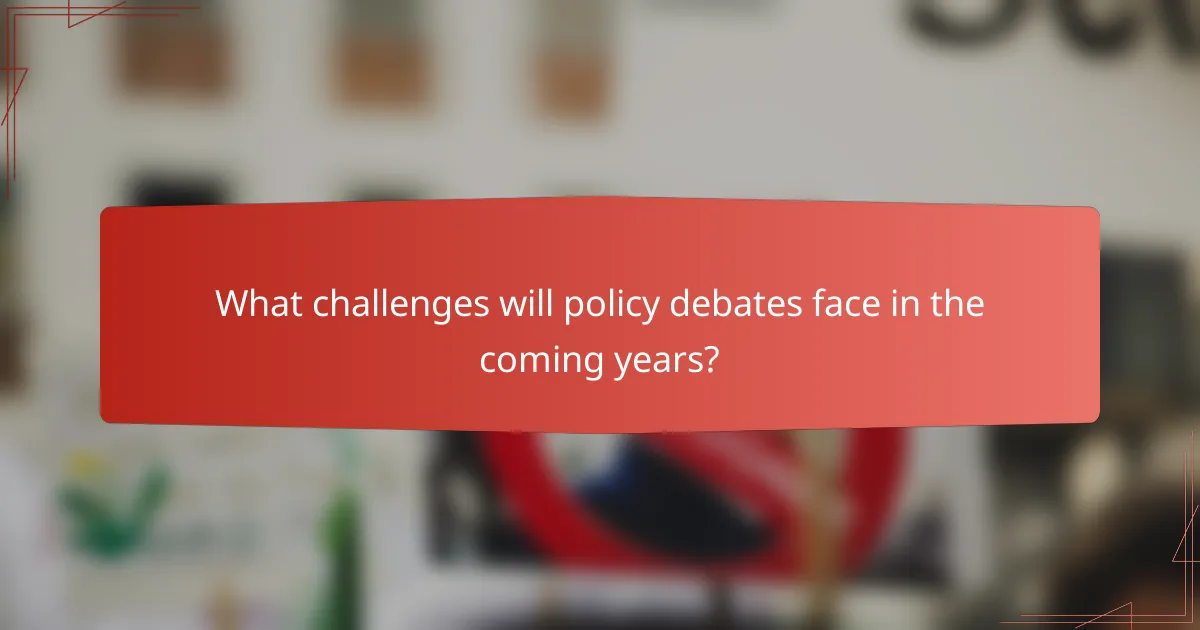
What challenges will policy debates face in the coming years?
Policy debates will increasingly confront challenges such as public opinion polarization, information overload, access to reliable data, and the need to adapt to rapid technological changes. These factors will complicate the landscape of policy discussions and decision-making.
Polarization of public opinion
Polarization of public opinion is becoming more pronounced, leading to divided viewpoints on critical issues. This division can hinder constructive dialogue and compromise, making it difficult for policymakers to find common ground.
To navigate this challenge, debaters should focus on framing discussions around shared values and interests. Engaging diverse stakeholders and fostering inclusive conversations can help bridge gaps in understanding.
Information overload
Information overload presents a significant challenge, as the sheer volume of data available can overwhelm participants in policy debates. With numerous sources competing for attention, distinguishing credible information from misinformation becomes crucial.
To manage information overload, debaters should prioritize key messages and utilize trusted sources. Creating concise summaries or infographics can help distill complex information into digestible formats, aiding clarity and comprehension.
Access to reliable data
Access to reliable data is essential for informed policy debates, yet disparities in data availability can create uneven playing fields. Some regions may have robust data sources, while others struggle with outdated or incomplete information.
To improve access, stakeholders should advocate for open data initiatives and collaborate with research institutions. Utilizing platforms that aggregate data can also enhance the availability of reliable information for all participants.
Adapting to rapid technological changes
Rapid technological changes pose both challenges and opportunities for policy debates. As new technologies emerge, they can disrupt existing frameworks and necessitate quick adaptations in policy discussions.
Debaters should stay informed about technological advancements and their implications for society. Embracing technology, such as virtual debate platforms, can enhance participation and broaden the reach of policy discussions.
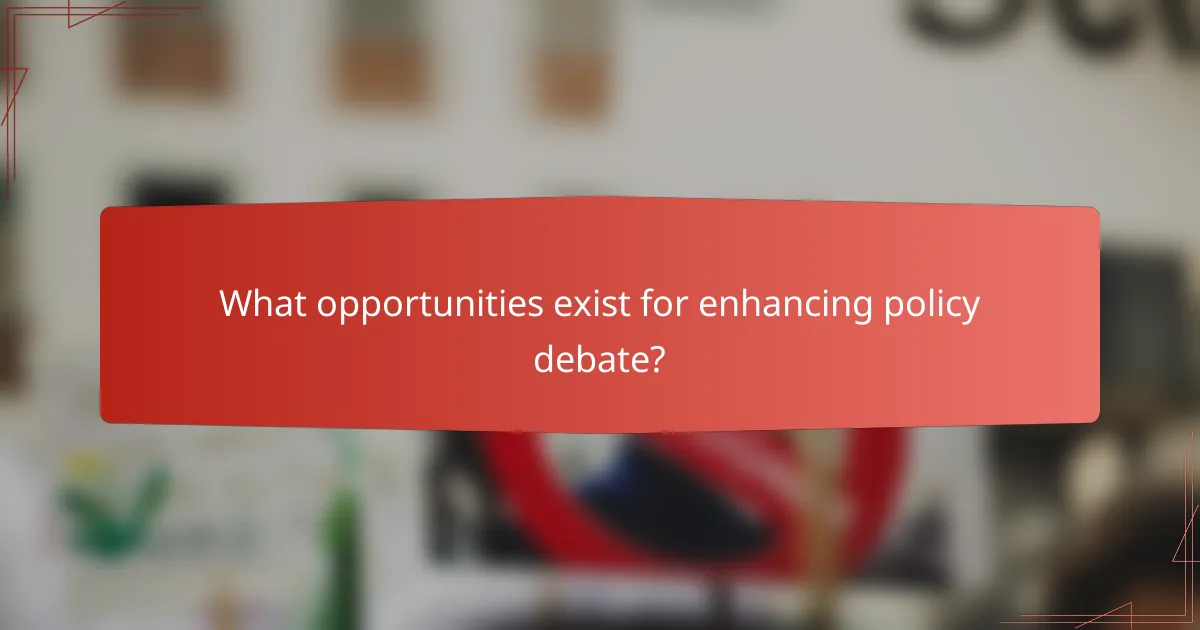
What opportunities exist for enhancing policy debate?
Enhancing policy debate involves leveraging technology, fostering collaboration, engaging younger audiences, and incorporating diverse viewpoints. These opportunities can lead to more informed discussions and innovative solutions to complex issues.
Utilization of online platforms
Online platforms provide a dynamic space for policy debate, allowing participants from various locations to engage in discussions. Tools like video conferencing and social media can facilitate real-time interactions and broaden the audience reach.
To effectively utilize these platforms, consider hosting webinars or live Q&A sessions where experts can address pressing policy issues. Ensure that the technology is user-friendly to encourage participation from all demographics.
Collaboration with think tanks
Partnering with think tanks can enrich policy debates by integrating research and expert insights. These organizations often have access to valuable data and analysis that can inform discussions and provide a solid foundation for arguments.
When collaborating, identify think tanks that align with your policy focus and invite them to co-host events or contribute to discussion materials. This partnership can enhance credibility and attract a more knowledgeable audience.
Engagement of youth in discussions
Engaging youth in policy debates is crucial for fostering future leaders and ensuring that diverse perspectives are represented. Young people bring fresh ideas and can challenge traditional viewpoints, making discussions more vibrant and relevant.
To involve youth, consider organizing competitions, workshops, or forums specifically aimed at younger audiences. Providing platforms for their voices can lead to innovative solutions and increased interest in civic engagement.
Incorporation of diverse perspectives
Incorporating diverse perspectives in policy debate enhances the richness of discussions and leads to more comprehensive solutions. Different backgrounds and experiences can illuminate various aspects of an issue that may otherwise be overlooked.
To achieve this, actively seek out participants from underrepresented communities and ensure that their voices are heard. Create an inclusive environment where all viewpoints are valued, which can foster more productive and meaningful conversations.
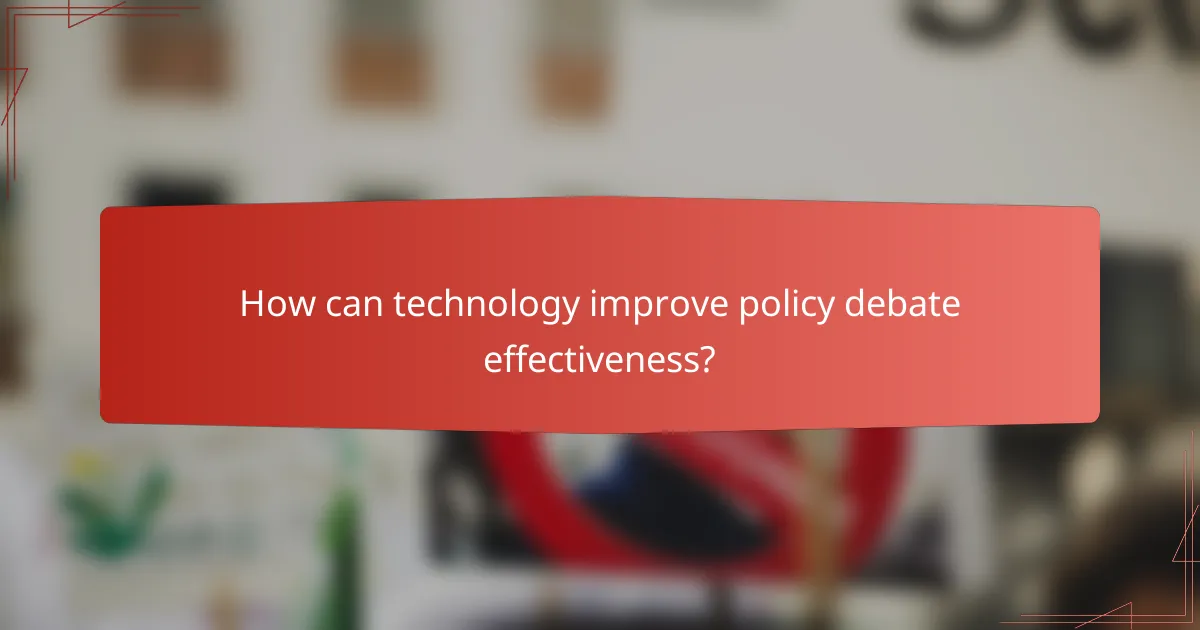
How can technology improve policy debate effectiveness?
Technology can significantly enhance the effectiveness of policy debates by providing tools for data analysis, creating immersive environments, and facilitating broader participation. These advancements can lead to more informed discussions and a wider range of perspectives.
Use of AI for data analysis
AI can streamline the process of data analysis in policy debates by quickly processing large volumes of information and identifying trends. This allows debaters to focus on relevant data points, enhancing the quality of their arguments.
For instance, AI tools can analyze public opinion data, legislative histories, and economic indicators to provide insights that inform debate topics. By utilizing these tools, participants can back their claims with solid evidence, improving the overall discourse.
Virtual reality for immersive discussions
Virtual reality (VR) offers a unique platform for policy debates by creating immersive environments where participants can engage in realistic simulations. This technology allows debaters to experience scenarios as if they were real, fostering deeper understanding and empathy for different viewpoints.
For example, a VR setup could simulate the impact of a proposed policy on various communities, enabling participants to explore outcomes in a more interactive way. This can lead to more nuanced discussions and a greater appreciation for the complexities involved in policy-making.
Online forums for broader participation
Online forums expand the reach of policy debates, allowing individuals from diverse backgrounds to contribute their perspectives. This inclusivity can enrich discussions and lead to more comprehensive solutions.
Platforms like social media, dedicated debate websites, and community forums enable participants to share ideas and engage in discussions regardless of geographical barriers. However, it is essential to moderate these forums to ensure constructive dialogue and prevent misinformation from spreading.
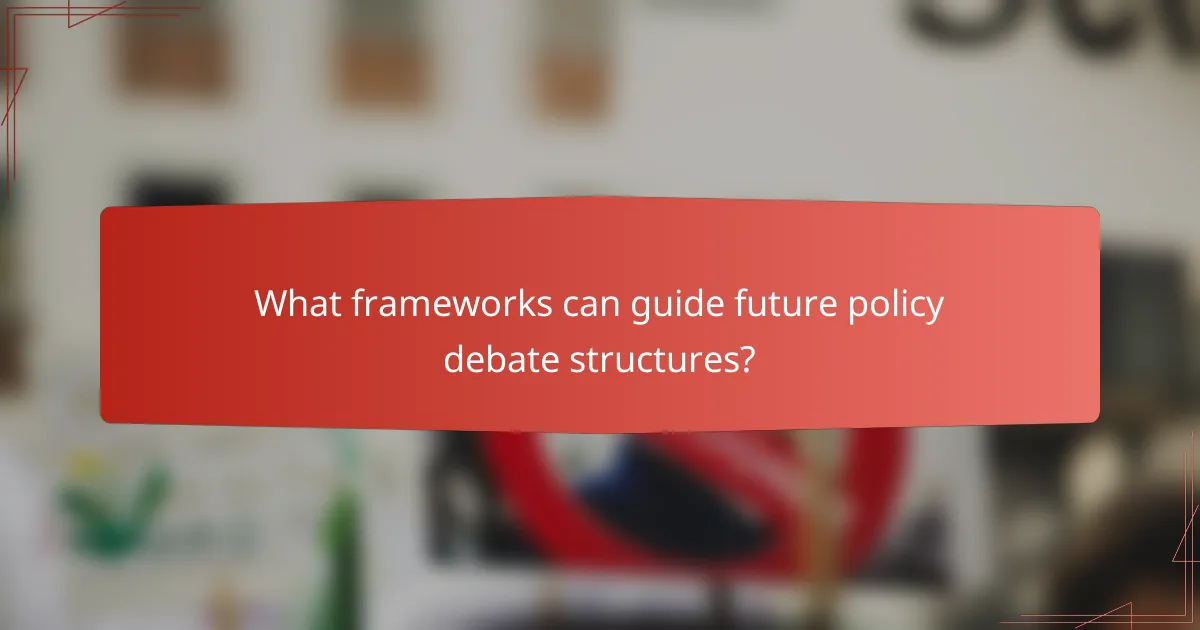
What frameworks can guide future policy debate structures?
Future policy debate structures can be guided by frameworks that emphasize collaboration and informed discussion. These frameworks help create environments where diverse perspectives can be integrated into decision-making processes.
Consensus-building models
Consensus-building models focus on achieving agreement among stakeholders with differing viewpoints. This approach encourages participants to engage in dialogue, identify common ground, and work towards mutually beneficial solutions.
Key steps include establishing ground rules for respectful communication, facilitating open discussions, and using techniques like interest-based negotiation. For example, in a community planning debate, stakeholders might prioritize shared goals such as sustainability and economic growth to reach a consensus on land use.
Deliberative democracy principles
Deliberative democracy principles emphasize informed and thoughtful discussion as a foundation for decision-making. This framework encourages participants to consider various perspectives and the implications of their choices before arriving at conclusions.
Practical specifics include organizing structured forums where citizens can discuss policy issues, providing access to unbiased information, and ensuring diverse representation. For instance, a deliberative poll might gather citizens to discuss healthcare policies, allowing them to weigh options and express informed preferences.
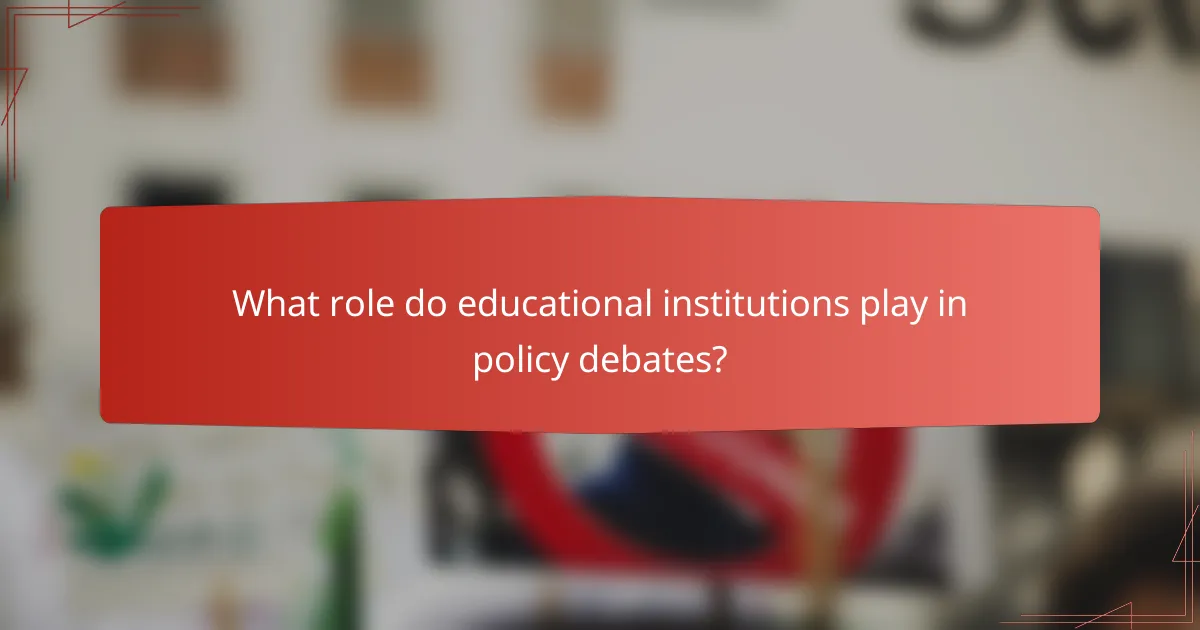
What role do educational institutions play in policy debates?
Educational institutions serve as vital platforms for policy debates, fostering critical thinking and informed discourse among students. They provide resources, training, and environments conducive to understanding complex issues and developing persuasive arguments.
Facilitating Research and Knowledge Creation
Educational institutions are key in generating research that informs policy debates. Universities often conduct studies that analyze social, economic, and environmental issues, providing evidence-based insights that policymakers can use. This research can range from local community studies to global challenges, helping to shape informed discussions.
Training Future Leaders
Institutions prepare students to engage in policy debates by teaching essential skills such as public speaking, critical analysis, and ethical reasoning. Programs in political science, law, and public policy often include debate components, allowing students to practice articulating their views and understanding opposing perspectives. This training is crucial for developing future leaders who can navigate complex policy landscapes.
Creating Collaborative Environments
Many educational institutions foster collaboration between students, faculty, and external stakeholders, including government agencies and NGOs. These partnerships can lead to joint initiatives that address pressing policy issues. For example, universities may host forums or workshops where students can engage with policymakers, enhancing their understanding of real-world challenges.
Encouraging Civic Engagement
Educational institutions play a significant role in promoting civic engagement among students. By encouraging participation in local governance, community service, and advocacy, schools and universities help students understand the importance of active citizenship. This engagement can lead to a more informed electorate and a stronger democratic process.
